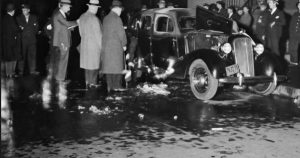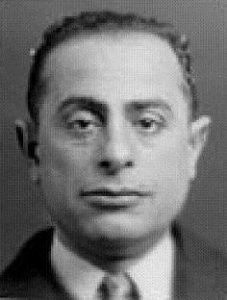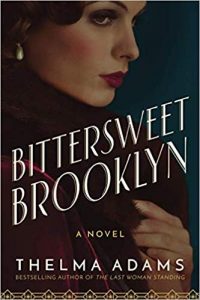Where I Find My Inspiration: Thelma Adams
 I find a lot of my inspiration for writing novels in the past. For my current book, out November 6th, Bittersweet Brooklyn: A Novel , part of the inspiration came from a crime that occurred in October 1935. And that crime, the murder of “Pretty Amberg,” the aftermath pictured in the photograph above, somehow involved my Great Uncle Abraham Lorber.
I find a lot of my inspiration for writing novels in the past. For my current book, out November 6th, Bittersweet Brooklyn: A Novel , part of the inspiration came from a crime that occurred in October 1935. And that crime, the murder of “Pretty Amberg,” the aftermath pictured in the photograph above, somehow involved my Great Uncle Abraham Lorber.
His family called him Abie; his colleagues “Little Yiddle,” in part because he was all of five foot two inches. (A detail I unearthed in his draft records.)
Abie was a low-level guy in Murder, Inc. – Wikipedia , a predominantly Jewish hitman-for-hire service that peaked in the 1930s and flamed out in the 1940s in a blaze of betrayal and the sizzle of the electric chair at Sing Sing. It’s notable that, although I never met Uncle Abie, he lived to a ripe old age when so many of his compatriots didn’t.
I found information outside of family lore (“he was quick with a knife”) from Rich Cohen’s fascinating book Tough Jews. So, from the inspiration of a criminal in the past, I began plastering on facts in print. Abie was a footnote in Cohen’s book. In the discussion of Russian immigrant mobster Amberg (pictured below), Cohen notes that “He spent his nights at Yiddel Lorber’s, a hangout for Jewish gangsters near the on-ramp of the Wiliamsburg Bridge.”
 Ping! Page 120, 121 and later 185. Three hits in the index at the back of the book. Like Josephine Sarah Marcus, who was a (relatively larger) footnote in the volumes on Wyatt Earp, became his constant companion and was the subject of my novel The Last Woman Standing, these small mentions, these icebergs, piqued my curiosity. And what I discovered was that Little Yiddel’s hangout on 128 Marcy Avenue in the Williamsburg section of Brooklyn would become the Williamsburg Boys Club. Like John Gotti’s famous The Ravenite Social Club: John Gotti’s Bunker 247 Mulberry Street in Manhattan’s Little Italy or Midnight Rose’s Candy Store on the corner of Saratoga and Livonia in East New York The Old Headquarters of Murder, Inc, these were centers of criminal activity with known street addresses.
Ping! Page 120, 121 and later 185. Three hits in the index at the back of the book. Like Josephine Sarah Marcus, who was a (relatively larger) footnote in the volumes on Wyatt Earp, became his constant companion and was the subject of my novel The Last Woman Standing, these small mentions, these icebergs, piqued my curiosity. And what I discovered was that Little Yiddel’s hangout on 128 Marcy Avenue in the Williamsburg section of Brooklyn would become the Williamsburg Boys Club. Like John Gotti’s famous The Ravenite Social Club: John Gotti’s Bunker 247 Mulberry Street in Manhattan’s Little Italy or Midnight Rose’s Candy Store on the corner of Saratoga and Livonia in East New York The Old Headquarters of Murder, Inc, these were centers of criminal activity with known street addresses.
While I now know more than the average bear about this rich vein of criminal lore, it was Abie’s little sister Thelma’s story I wanted to tell. She was my grandmother who died a year before I was born. She didn’t leave the trail of newspaper reports (stabbing, larceny, material witness, attempted assassination) or crime records that her older brother did. But, poring through the census data on Genealogy, Family Trees & Family History Records of Ancestry.com, I began to fill in the dots of her life in her brother’s shadow.
And, so, here is where the narrative pivots from its true-crime inspiration. I was curious about both the collateral damage of criminality in the family, and sculpting complex portraits of what must have been a very dysfunctional crew with roots in Drohobych, Galicia. I wanted to sing my grandmother’s story even if it was to a klezmer melody, a dance tune in a minor key with an antic clarinet where both light and dark conjoin.
People like my grandmother may live their entire lives outside of newsprint and book footnotes: I wanted to know who she was. Knowing Abie’s epic chutzpah and life force, I figured that quality may have run in the family. And, since I had been told I resembled her, I also wanted to know what it felt like to burn with intelligence, vitality and sexuality and be so limited by the time in ways to express it. I came of age in the time of women’s liberation, however flawed. What was it like to be a liberated woman before her time, a woman who, in some sense, ran with wolves.
The crime that October night in 1935 — the senseless burning of Pretty Amberg’s corpse after he’d been slit to pieces at Little Yiddel’s over bottle of vodka— was also a symbol for lives that shine bright and burn out. I wanted to understand that woman, my father’s mother, who I witnessed through the oversized character that was her son. He was a champion of the underdog — a union leader, a political activist, an involved and loving father. And it only seemed fitting to champion him by resurrecting his mother, my grandmother, in full. And, in so doing, restore a chunk of the wildness that also flowed in my veins, and a sense of how far I’ve come in our immigrant’s — and female — journey.
I find inspiration in history — and that’s only the beginning of a long and twisted journey into the understanding of the human condition that is fiction.
—

Thelma Adams, Author portraits. Photo credit: Emily Assiran
Thelma Adams is the author of the historical novel Bittersweet Brooklyn, the bestseller The Last Woman Standing and Playdate, which Oprah magazine described as “a witty debut novel.” In addition to her fiction work, Adams is a prominent American film critic and an outspoken voice in the Hollywood community. She has been the in-house film critic for Us Weekly and The New York Post, and has written essays, celebrity profiles and reviews for Yahoo! Movies,The New York Times, O: The Oprah Magazine, AARP.com, Variety,The Hollywood Reporter, Parade, Marie Claire and The Huffington Post. Adams studied history at the University of California, Berkeley, where she was valedictorian, and received her MFA from Columbia University. She lives in upstate New York with her family.
Find out more about her on her Website http://thelmadams.com/wordpress/
BITTERSWEET BROOKLYN, Thelma Adams
 In turn-of-the century New York, a mobster rises—and his favorite sister struggles between loyalty and life itself. How far will she go when he commits murder?
In turn-of-the century New York, a mobster rises—and his favorite sister struggles between loyalty and life itself. How far will she go when he commits murder?
After midnight, Thelma Lorber enters her brother Abie’s hangout under the Williamsburg Bridge, finding Jewish mobster Louis “Pretty” Amberg in a puddle of blood on the kitchen floor. She could flee. Instead, in the dark hours of that October 1935 night before the dawn of Murder, Inc., she remains beside the fierce, funny brother who has nurtured and protected her since childhood.
There are many kinds of love a woman can feel for a man, but few compare to that of the baby sister for her older brother. For Thelma, a wild widow tethered to a young son, Abie is the center of her world. But that love is about to undo everything she holds dear…
Flipping the familiar script of The Sopranos, Boardwalk Empire, and The Godfather, Bittersweet Brooklyn explores the shattering impact of mob violence on the women expected to mop up the mess. Winding its way over decades, this haunting family saga plunges readers into a dangerous past—revealed through the perspective of a forgotten yet vibrant woman.
“Thelma Adams is our new Dickens in her effervescently vivid tale of Jewish hardscrabble living, gangsters, torn-apart families, and a young woman desperate for love, family, and a stable future. Set in a 1920s and 30s Brooklyn so rich, raw, and bristling with life that you can taste the brine on the deli pickles and see the flasks of whiskey hidden in a garter, this is the kind of novel that’s lived, rather than read.” — Caroline Leavitt, New York Times and USA Today bestselling author
“Smart and complex, Bittersweet Brooklyn is a riveting journey into a glamorous and deadly underworld. Fascinating characters and a backdrop of New York in the 1920’s kept me churning through pages. Add in twist after twist to an already vibrant plot, and you’ve got the makings of a perfect read! No one writes women in history better than Thelma Adams. I loved this book!” —Heather Burch, bestselling author of In the Light of the Garden
BUY THE BOOK HERE
Category: Contemporary Women Writers, On Writing

























